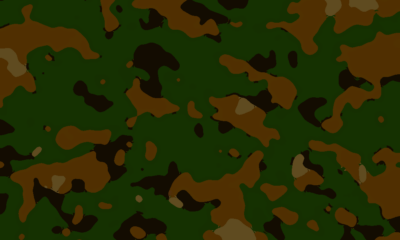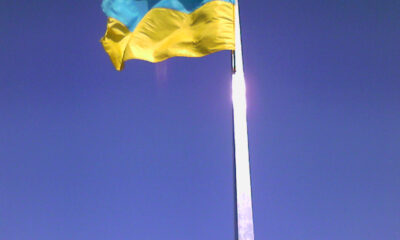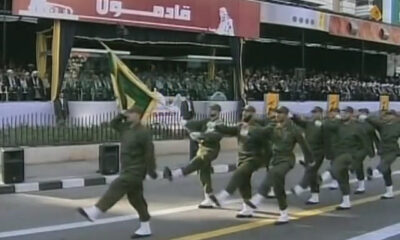World news
Naksa protests underwhelming, some staged
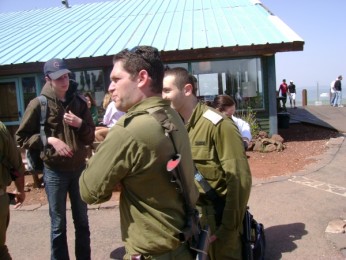
Today’s Naksa Day protests were less impressive than the Nakba Day protests three weeks ago. Worse, the Syrians might have staged the scene.
Naksa Day figures
The Jerusalem Post filed this report on protests at the Kalandia checkpoint on the Jerusalem-Ramallah highway. A mob tried to storm the checkpoint and march to the Al-Aqsa Mosque on the Temple Mount in the Old City. They couldn’t get past the Tzahal. 40 people suffered tear gas inhalation, and 2 suffered more serious injuries.
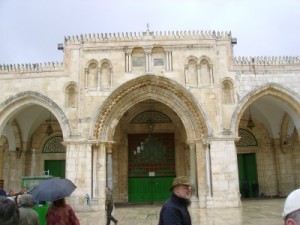
The Al Aqsa Mosque. Naksa Day protesters tried to reach it but could not get past the checkpoint. Photo: CNAV
A more serious scene played out in Kunetra along the Syrian-Israeli border in the Golan Heights. Again a mob tried to storm the border at this checkpoint. The Tzahal answered with bullets and tear gas. 18 protesters fell dead and 277 suffered wounds. All these casualty reports come from Syrian TV and Agence France-Presse. Neither the Tzahal nor any Israeli news organ could confirm these figures independently.
These figures involve two separate incidents. In each, a company or rump-battalion-sized crowd tried to surge through minefields between Syrian and Israeli border fences. In one incident, protesters threw Molotov cocktails. Those firebombs started fires that set off four mines. What is more remarkable is that the mines are Syrian, not Israeli.
In contrast, as many as 1000 protesters—a rump regiment—had tried to storm the border at the Golan on Nakba Day.
An unimpressive showing
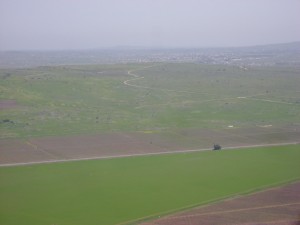
From Israel toward Damascus, in the Golan Heights. Did Naksa Day protesters use this road? Photo: CNAV
Ron Ben Yishai at Ynet News said that Naksa Day failed. He cited three reasons for this:
- The Arabs were less enthusiastic for the event. That should surprise few people. Never before have the Arabs staged a major protest on Naksa Day, which marks their defeat in the 1967 War. They reserve their protest for the day (in the Gregorian calendar) of Israel’s independence.
- The Tzahal were ready for them. They were not only ready to meet them, but they also made them run an obstacle course. Furthermore, the Tzahal showed, in their response to the Nakba Day incidents, that they knew how to handle things. Few Arabs were willing to take chances on that.
- Most Arab authorities closed the borders so that incidents like these would not occur. Hamas (Gaza), Al-Fatah (West Bank), and authorities in Lebanon definitely closed their borders.
Did Syria stage the scene?
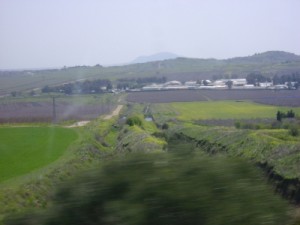
Farming in the Golan Heights. Only after Israel recaptured the Golan did these farms spring up again. (Photo: CNAV)
Only at the Syrian border did protesters suffer more than light casualties. And an opposition party flatly accused the Syrian government of staging the scene. The Reform Party of Syria said that the Syrian government paid several poor Syrian farmers to try to cross the border. These farmers, according to the RPS, have migrated southward, toward the borders with Israel and Jordan, from drought-stricken areas to the north and east. These farmers typically make $200 US per month. The government allegedly paid them $1000 to show up, and promised a $10,000 bounty to their families if the Tzahal shot and killed them.
Ron Ben Yishai did not comment on the RPS allegation. But he did say that the Syrians drove the protesters to the border sites, had Syrian TV on hand to film what happened, and even had ambulances and medics ready to treat and carry off the casualties.
Conclusion: Naksa a bust
So this first Naksa Day was a bust. Even the Syrians could not stage as dramatic a scene as the one that played out the last time.
[amazon_carousel widget_type=”ASINList” width=”500″ height=”250″ title=”” market_place=”US” shuffle_products=”True” show_border=”False” asin=”B002EQA102, 0471679526, 044654146X, 0789209284, 0688123635, 0345461924, 0253349184, 1929354002, B00005S8KR, B000RPCJPC” /]
This does not mean that all-out war is any less likely. Egypt is more likely to provoke that, as it did in 1967. But the Naksa Day events clearly cannot capture anyone’s imagination. So when the Arabs do go to war against Israel, they will have less excuse.
Featured image: Tzahal soldiers walk past American tourists and Israeli students on the promontory that overlooks the Damascus Road. Photo: CNAV.
Terry A. Hurlbut has been a student of politics, philosophy, and science for more than 35 years. He is a graduate of Yale College and has served as a physician-level laboratory administrator in a 250-bed community hospital. He also is a serious student of the Bible, is conversant in its two primary original languages, and has followed the creation-science movement closely since 1993.
-

 Executive4 days ago
Executive4 days agoSecret Service chief gets no solace
-

 Executive3 days ago
Executive3 days agoWaste of the Day: Louisville Taxpayers Pay Nearly $600,000 For Empty Building’s Maintenance, Security
-

 Guest Columns4 days ago
Guest Columns4 days agoFear Itself: Democrats’ Favorite Strategy Caused Their Current Chaos
-

 Executive3 days ago
Executive3 days agoWhere is Joe Biden – or Jill?
-

 Executive1 day ago
Executive1 day agoWaste of the Day: Throwback Thursday: Cities Used Crime Prevention Funds on Soccer Games, Paper Shredding
-

 Executive2 days ago
Executive2 days agoFacile and politically motivated suggestions
-

 Civilization4 days ago
Civilization4 days agoBuild Iron Dome in the United States To Prepare for Israel’s Worst Day
-

 Executive4 days ago
Executive4 days agoThe Emerging GOP Plan To Beat Kamala Harris



